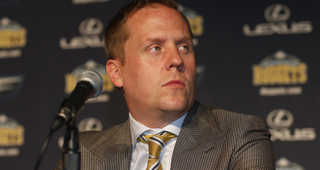The Denver Nuggets enter the 16-17 season looking to reverse three straight seasons without a playoff appearance. For a team that made the postseason for ten consecutive seasons before the current drought, this is the primary goal. The Nuggets have assembled one of the deepest rosters in the entire NBA but is that necessarily a good thing?
Denver seems set to roll with a starting five of Jusuf Nurkic, Nikola Jokic, Danilo Gallinari, Gary Harris (once he’s healthy) and Emmanuel Mudiay. That group features a nice mix with the veteran Gallinari surrounded by young players. It also offers versatility with shooting, driving ability and inside scoring. All around it is a nice core that complements each other well.
Beyond those five, the Nuggets have at least eight players who deserve minutes as NBA veterans, or need minutes as developing young players. Kenneth Faried, Wilson Chandler, Will Barton, Jameer Nelson and Darrell Arthur fit in the first group. First round draftees Jamal Murray, Juancho Hernangomez and Malik Beasley make up the second group. You could even argue that Mike Miller could be added to the first group, but that is probably a stretch given his age and productivity at this point in his career. In addition, Denver might have the deepest group of NBA quality camp invites in the entire league, making this an extremely competitive roster situation.
At first glance, that much depth is great. Denver is covered in case of injuries and they’ve seen plenty over the years and aren’t quite healthy as of this writing either. Harris is currently out, Arthur is working his way back from offseason surgery, Chandler missed the entirety of last season, Gallinari has had problems staying healthy for years, and so on and so forth. This much depth can also make it easy for a coach to keep everyone fresh and not have to push anyone too hard.
It is also great to have a mix of veterans and young players. The youngsters don’t feel as much pressure to perform with vets to pick up the slack. The older players are pushed by the up and comers behind them, but know they have some rope due to their status on the team and in the league. Practices become competitive game-like environments where all 15 players are constantly pushing each to be better.
However, in Denver’s case you have to ask the question: when is all this depth too much? We can start with the premise that the Nuggets have thirteen players who deserve or need to play, which is a challenge for any coach. Let’s assume, given the Nuggets’ track record with health, that two players of that group will be out at any given time. That still leaves 11 players battling for minutes. Most NBA teams like to play a primary rotation that consists of eight or nine players, maybe 10 in the dog days of the regular season. Even in a 10 man rotation, someone is generally getting less than 10 minutes a night. Let’s do a little math:
Total Minutes Available: 240
Starters (assuming 30 minutes each, which is around league average): 150
Available bench minutes: 90
Minutes per bench player (assuming 10 man rotation): 18
Eighteen minutes per each reserve in the rotation sounds reasonable, right? Factor in that Will Barton, who received some 6th Man of the Year publicity, played 26 minutes off the bench last. Now we take away eight minutes and give them to Barton. The Nuggets also have a couple of young guys who are destined to play more than the retread veterans they replaced, so give them some extra minutes too. All of a sudden, you are down to precious few minutes left, or pulling minutes from the starters, which probably isn’t happening.
Some people would say this is a great problem to have, but those people aren’t Mike Malone, who has to manage this roster on a nightly basis. It is long held that the three most important things to most NBA players are: money, minutes and shots. And it isn’t necessarily in that order either. If any of those three comes up short, the other two legs of the tripod also get out of balance. Players who don’t receive minutes on a regular basis will start hunting for their own shots. Players whose contracts are up soon, start looking out for themselves vs doing what is best for the team. It is difficult for a coach and general manager to manage minutes and more fail at it than you would think.
Further complicating things for Denver is the makeup of the roster. Instead of a nice balance of experience and youth, you can look at it as a roster full of hungry players yearning to prove themselves. Gallinari can be a free agent next summer and he wants to prove he can carry a team and is worth of one more big contract as he nears age 30. Chandler wants to get back in the mix after missing an entire year and show that he’s healthy and ready to contribute. Faried is motivated to prove he’s still a valuable player that can be a rotation player on a playoff team.
Behind the veterans you have Nurkic and Jokic, who are the young big men the Nuggets are building around. They need minutes, especially together, for Denver to decide if they are a good fit next to each other. Hernangomez didn’t come over from Spain to sit, and his bouncy, energy filled game will only help the Nuggets win games. And this is before we mention Darrell Arthur, who signed a very team friendly with designs on playing a big role off the bench.
On the wing, Harris, Murray and Beasley will battle each other for minutes at shooting guard, with Beasley occasionally playing some small forward behind Gallinari and Chandler and Murray possibly swinging over to play some point guard. Speaking of the point, that seems one of the more settled spots. Mudiay will play as many minutes as he can handle and Nelson is comfortable in his veteran backup role behind him.
One last complicating factor for Denver is that they have a lot of good to very good players, but lack a truly great player. No roster in the league screams consolidation trade more than the Nuggets. With so many guys who have to see playing time, something has to give. After this year, Denver will add their own first round pick and likely a pick from Memphis as well. Three first rounders last year and two more this year gives them 1/3 of a roster with one year or less of experience. That is the makeup of a team that is starting the rebuilding process, not one that should be nearing the end of it.
Tim Connelly has done a great job building up the Nuggets asset base. Now is the time to cash in. As currently structured, it is hard to picture the Nuggets getting past all the teams in front of them to make the playoffs. Not while Malone also has to also balance developing the young players for the future. Denver should be looking to make a consolidation trade where they send out 2-4 players and bring back 1-2 players, even if it is a potential overpay. Anything that balances the roster, while also bringing them closer to the playoffs should be considered.
The Boston Celtics were in this position over the last two years and never really consolidated for that big piece, but not for lack of trying. Boston made the playoffs while walking that tightrope, but that was in a less competitive Eastern Conference. Boston parlayed cap flexibility into Al Horford in free agency, but still doesn’t have a true star. Danny Ainge and Daryl Morey are fond of saying you accumulate assets, so that when a star becomes available you can pounce and snag him. Connelly has the assets to take a similar approach. If no star player develops, the Nuggets might go from promising to prickly really quickly. And that would be unfortunate for a club that could be on the verge of something special.



